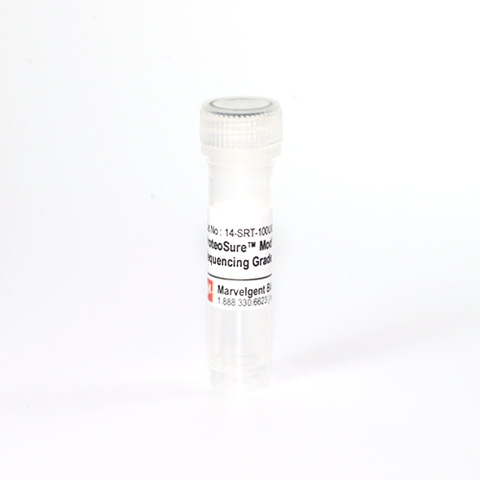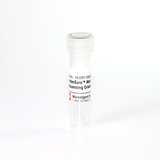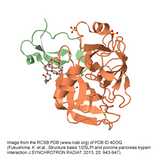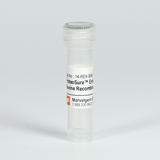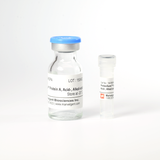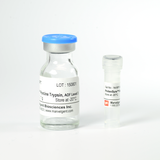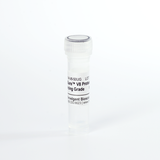ProteoSure™ Modified, Recombinant Porcine Trypsin, Autolysis-Resistant for Proteomic Sequencing and Mass Spectrometry Analysis
Catalog NO.
Highly pure, genetically improved, chemically modified trypsin variant with superior specific enzymatic activity and highest autolysis-resistance. Suited for peptide mapping applications or protein identification by peptide mass fingerprinting or MS/MS spectral matching. ... Read more
Description
Product highlights
-
Enables fast digestion and reduces wait time in sample preparation;
- Free of non-tryptic activities for high quality, unambiguous mass spectral interpretation;
- Provides enhanced peptide map coverage;
- Suits a wide range of proteomics applications.
Product overview
Trypsin is a crucial serine protease that specifically cleaves peptide bonds at the carboxyl side of lysine and arginine residues. It is widely utilized in mass spectrometry-based protein analysis and proteomics due to its high proteolytic activity and cleavage specificity.
ProteoSure™ Modified, Recombinant Porcine Trypsin is a highly purified recombinant variant of porcine trypsin. It has been genetically optimized and chemically modified to achieve superior resistance to autolysis and maximize specific tryptic activity.
Free from Non-Specific Protease Contaminants
Most commercially available proteomic-grade trypsin products are derived from animal pancreatic extracts and may contain traces of chymotrypsin, carboxypeptidase A, and other proteases. Although chymotrypsin activity can be inhibited by treatment with TPCK (L-(tosylamido-2-phenyl) ethyl chloromethyl ketone), the residual activity as well as other contaminants can compromise protein analysis quality and extend digestion times.
ProteoSure™ Recombinant Porcine Trypsin is expressed and purified from E. coli in a strictly controlled system, ensuring batch-to-batch consistency. Our recombinant trypsin is free from contaminating protease activities, and it does not require TPCK treatment.
Superior Autoproteolytic Resistance
The unmodified, native trypsin (β-trypsin) is prone to autolysis, forming α-trypsin, which exhibits reduced stability and efficiency. Further degradation of α-trypsin results in pseudotrypsin (ψ-trypsin), showing broad non-specific activities, including chymotrypsin-like activity. These changes compromise the enzyme’s performance, affecting reproducibility in protein digestion and mass spectrometry-based identification.
ProteoSure™ Modified, Recombinant Porcine Trypsin is specifically designed to address the autolysis issue. It is a highly purified recombinant porcine trypsin variant that has been genetically improved for enhanced resistance to autoproteolysis.
Additionally, it undergoes a proprietary reductive methylation process resulting a modified sequence that exhibits significantly enhanced resistance to autoproteolysis, making it superior to other recombinant trypsin products (see below Figure 1).
High Efficiency and Enhanced Sequence Coverage
With its precise tryptic specificity, enhanced resistance to autolysis, and no contaminating proteases, ProteoSure™ Modified, Recombinant Porcine Trypsin can be optimized for protocols that require high enzyme-to-protein ratios, significantly reducing digestion times while providing superior sequence coverage for unambiguous mass spectral analysis (Figure 2). This cost-effective, high-performance trypsin meets the stringent demands of both research and biopharmaceutical analysis, eliminating the need to choose between sequencing-grade and MS-grade trypsin.
ProteoSure™ Modified, Recombinant Porcine Trypsin can also be used in combination with Lysyl Endopeptidase (Lys-C)to further improve peptide mapping, particularly for complex proteins.
Applications
It is suitable for in-solution or in-gel protein digestion in applications:
- Peptide sequencing and tryptic mapping
- Protein identification by peptide mass fingerprinting or MS/MS spectral matching.
- Protein-structure studies
Technical notes
ProteoSure™ Modified, Recombinant Porcine Trypsin possesses mutation that is dedicatedly optimized for greater autolysis-resistance. Most commonly used MS grade Trypsin proteases are modified from native Trypsin that are derived from porcine or bovine pancreatic extracts. Although modification by reductive methylation significantly reduces autolysis, autolytic products of modified Trypsin are commonly found in digests and show as characteristic peaks in the chromatogram of HPLC. It has been also suggested that these autolytic products are present during the purification process from the pancreas prior to modification.
By introducing mutations to the porcine trypsin sequence, the resultant protease variant has obtained much greater autolysis-resistance after modification by reductive methylation at Lysine residues, in comparison with the modified native protease. Shown in Figure 1, after enzymatic digestion incubated with ProteoSure Sequencing Grade Modified Tryspin, the characteristic peaks of the autolysed trypsin fragments are not detectable by RP-HPLC.

Figure 1. Autolysis of the modified native porcine trypsin from Manufacturer P and Marvelgent’sProteoSure™ Modified Recombinant Trypsin. The two proteomic grade trypsin proteases were diluted to 0.05 mg/mL in 50 mM NH4HCO3 (pH 8.0), and then incubated at 37°C. After 3 hours incubation, the protein samples were analyzed by RP-HPLC. In comparison with the protein prior to incubation, the modified trypsin from Manufacturer P has the protein peak shifted from the original position after 3 hour incubation at 37°C, suggesting that autolysis of trypsin occurred and it resulted in smaller fragments of trypsin. However, ProteoSure™ Modified Recombinant Trypsin showed a peak at the same position before and after 3 hour incubation at 37°C, suggesting that the enzyme remained intact.

Figure 2. Coverage maps of two monoclonal antibodies analyzed by LC-MS. The mAbs were proteolytically digested for 5 hours respectively with ProteoSure™ Modified, Recombinant Trypsin and that from Supplier P. The peptide sequences digested by ProteoSure™ rTrypsin delivered a coverage rate of 94.9% for mAb002 and 96.7% for mAb007, respectively (A and C). In comparison, the peptide sequences after digestion with Supplier P’s trypsin resulted in 91.9% and 95.8% coverage (B and D).
Instructions to use
- Dilute the product in 50mM HAc when needed. Immediately before use, dilute it with 50mM NH4HCO3 or a pH7-8 buffer. It is recommended to add 1mM CaCl2 to the reaction. The ratio of Trypsin to the protein sample should be between 1:20 and 1:100 (w/w). Keep the conditions within the optimum pH of Trypsin (pH7.8 - 8.7).
- Thaw a frozen aliquot of Trypsin solution at room temperature, and gently mix before use.
- When 0.05 mg/ml modified recombinant trypsin is used in buffer 50mM NH4HCO3, it retains greater than 95% activity after 3 hours incubation at 37°C. If longer digestion is desired, such as 20 hour incubation at 37°C, it is recommended to include 1mM CaCl2 to the reaction.
Recommended storage
- Store the product as lyophilized powder in a sealed container at 2 - 8°C. The product can also be stored at -10 to -20°C and is stable for up to 24 months.
- Once reconstituted, aliquots of the product should be stored at -20°C. The enzyme is stable for up to a year. The solution can also be stored at -70°C or below. It is stable within 24 months.
- Greater than 95% enzymatic activity retains after 5 repeated freezing-and-thawing cycles.
Product Details
| CAS # | 9002-07-07 |
| Enzyme Commission # | 3.4.21.4 |
| Molecular weight | 23.8 kDa |
| Origin of species | Porcine |
| Source | E.coli |
| Optimum pH | 7.8-8.7 |
| Purified by | HPLC |
| Physical form | Lyophilized powder. |
| Specific activity |
≥4500 USP /mg protein, autolytic activity minimized by reductive methylation. |
| Unit definition | One USP unit of trypsin activity will produce a Delta A253 of 0.003 per minute in a reaction volume of 3.0 mL at pH7.6 and 25℃, with BAEE as a substrate (1 cm light path). |
| Purity | ≥95% by HPLC |
| Contaminant activity |
No chymotrypsin, carboxypeptidase A, or other protease contaminants. |
| Storage | Store the product as the lyophilized powder in a sealed container at 2 - 8°C. Reconstitute the lyophilized enzyme powder in 1 mM HCl or 50 mM acetic acid to make a stock solution of 5 mg/mL. Once reconstituted, aliquots of the product should be stored at -70°C. It is stable within 24 months. Greater than 95% enzymatic activity retains after 5 repeated freezing-and-thawing cycles. |
| Intended use | For research only. Not intended for any human or animal diagnostic or therapeutic use. |
Documents
Product Information Sheet
🗎 Modified, Engineered Porcine Trypsin, Sequencing-Grade, Autolysis-resistant
Technical Note
Contact Us
Marvelgent Biosciences Inc.
Head Office
303 Wyman St, Waltham, MA 02451, USA
Telephone
1.888.330.6623
Fax
1.888.330.6623
Emails
Ordering support: order.support@marvelgent.com
Technical support: cust.support@marvelgent.com
Careers: career@marvelgent.com
You are welcome to leave a message using our Contact Form. We will get back to you within 24 hours.
We Also Recommend

